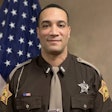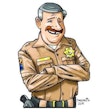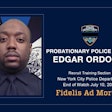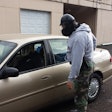
On April 19, 1995, at 9:02 a.m., Timothy McVeigh bombed the Alfred P. Murrah Federal Building in Oklahoma City. The explosion and partial building collapse killed 168 people, including 19 children, and injured more than 600 others. McVeigh was caught almost immediately because of an alert patrol officer during a traffic stop, tried and convicted in 1997, and executed by lethal injection on June 11, 2001.
Buffalo News reporters Dan Herbeck and Lou Michel interviewed McVeigh for 75 hours before he was executed. McVeigh called the deaths of the children "collateral damage" and felt no pity for the victims or their families.
The nation's most deadly domestic terrorist told the reporters that he worked alone on the plan to blow up the building, saying, "The truth is, I blew up the Murrah Building. And isn't it kind of scary that one man could reap this kind of hell?"
Despite McVeigh claiming he had no help with the plan, he did. Terry Nichols was later convicted as a co-conspirator and sentenced to life. And another man, Michael Fortier, was also convicted and sentenced to 12 years for his role in the attack.
This April we commemorated the 20-year anniversary of the bombing. And the repercussions from that day have reached farther than anyone could have expected. The aftereffects are just as real in the lives of some today as if they were present when the homemade bomb in the Ryder truck exploded.
The bombing even wrecked the life of one of the conspirators' children, who himself was innocent of the crime. To tell his story in no way diminishes sympathy for the blast victims and their families, it just illustrates the many interlocking effects of terrible events and how they affect everyone with links to this tragedy or who responded to the attack.
Nichols' Son
Joshua Nichols is the oldest son of Terry Nichols. He was 12 years old when the Murrah Building was bombed. When he was 16, Joshua traveled with his mother to Oklahoma City and met with Kathy Sanders, a good-hearted Christian woman who lost two grandkids in the bombing. Sanders hosted Joshua and his mother in her home for four days and treated them like family. This had been done in part, to head off the almost inevitable destruction coming for Josh as he matured into adulthood; to maybe place a cornerstone for healing to begin—a noble thing, no doubt.
The Oklahoma City National Memorial and Museum has a beautiful reflecting pool and a peaceful field with 168 empty chairs—hand-crafted from glass, bronze, and stone—that represent the victims who died. The children who perished are represented by 19 smaller chairs of identical design. Each chair is inscribed with a victim's name. Mrs. Sanders watched as Joshua stood, crying at the chairs that represented her grandsons.
That image breaks my heart. I imagine that sorrowful and innocent young man being my 16-year-old son.
Life has not been easy for Joshua Nichols. Before he dropped out of school, kids in Las Vegas cruelly nicknamed him "Bomber." Joshua bore the weight of his father's sins before he even knew how to deal with his own.
Today, Joshua is 32 and a seven-time convicted felon who has spent most of his adult life in and out of jail and prison. He's been involved in burglaries, auto thefts, and dangerous high-speed police pursuits, including one that injured an officer before Nichols crashed the car. And that's just the stuff he's been caught doing.
To this day, some of his criminal associates and even a few cops still call him "Bomber." Joshua hasn't had one day since 1995 where being the son of one of the Oklahoma City conspirators wasn't right in the front of his head. It's no shock to learn he turned to drugs to numb it all.
Implications
I have great sympathy for 12-year-old Joshua Nichols despite the crimes of his father. The boy had very little chance at a normal life after his dad helped McVeigh commit mass murder. I'd like to go back in time and somehow provide him a shield from the cruelty that forever marked him.
When Michael Fortier completed his prison sentence, he gained entry into the federal witness protection program, and anonymously started a new life. Joshua Nichols got no such favors and he wasn't involved in the bombing nor had knowledge beforehand of what his dad was doing. No anonymity for Joshua. No relocation. No job placement. Nothing much more than "Hey, that's too bad, Bomber. Now get over it."
How could a 12-year-old boy cope with any of that? How can a young man?
Even sympathy for a 32-year-old career felon isn't a stretch for the imagination. But not for what he has become, more for what he couldn't overcome.
As a cop, I'm torn. My sympathy for Joshua is outweighed by the desire to see my community protected from criminals like him. I don't have the luxury to give much sympathy to grown men who are a danger to my community and commit crimes with impunity. Frankly, I reserve most of my sympathy for the victims of his crimes.
Joshua Nichols continues to let his past dictate his future and is either unwilling or incapable of being the architect of something better for himself. Although, in 2014, while out on bail and before going to prison again, Joshua voluntarily turned over about $12,000 in methamphetamine to the police as a sign that he was trying to turn over a new leaf. Quite possibly, this was theater to aid in the pursuit of leniency in his pending criminal matters, but perhaps it was a start down another path.
Passing on the Darkness
Why am I telling you about Joshua Nichols?
As law enforcement officers we are exposed to death and the horrors of crime on a daily basis. We stare into the face of darkness as a matter of habit—it's where the evil in our communities resides. We see the worst in people and do our best to expose the ugliness before it causes further harm. But sifting through these experiences throughout our careers where we see so much destruction in the lives of people—yes, even the self-destruction of the criminals—is a difficult thing to unpack in our minds. It hardens us, and if we're not careful, it can make us socially dysfunctional in some ways.
I can tell you the experiences of my law enforcement career have left something on me that I struggle at times to get off. There is nothing innocent left about me that hasn't been covered by a multitude of grisly images and stories of rot and hurt and devastation.
Joshua Nichols' life was forever changed on April 19, 1995; there's no disputing that. But what is disputable, and I think Joshua might even one day see clearly, is the matter of choice.
Joshua is no longer a child. He knows the difference between right and wrong, yet chooses to do wrong anyway. Sure, he has a warped sense of the world around him from the devastation he experienced going from a normal, anonymous 12-year-old kid who didn't do anything wrong, to being the son of one of the most vilified people in modern U.S. history. But that doesn't excuse his own crimes.
Police officers also know the difference between right and wrong. Yet our gruesome and chilling experiences and the lasting images in our heads often lead to depression, alcohol, or substance abuse, which also leads to divorce or domestic violence and myriad other bad and sometimes criminal behaviors.
Not unlike Joshua Nichols, we can also have a warped sense of the world around us. Warped in a different way than what Joshua sees, but warped nonetheless. And little do we know, we're passing those very seeds on to our children as well.
Cops who fail to learn how to unpack this stuff end up carrying it to the end, albeit usually, a much quicker and grief-stricken end. The tangled, choking vine bears poisonous fruit into our lives and the lives of our family members.
Stop Making Casualties
Most people who weren't raised in a bubble experienced some form of destructive influence in their childhood. The sources may be different, maybe you had great parents. Maybe it was other children or teachers. Maybe it was your siblings. Perhaps it was the death of a parent or an ugly divorce in your family.
Your childhood trauma doesn't have to be as extreme as your father participating in planning a truck bomb attack that killed hundreds of people. It only has to be something that altered your perception of what's good in the world and what's good about yourself. However, each one of us, barring significant mental infirmity, is equipped with at least some rudimentary ability to cope with such challenges.
There's a story of two kids raised by their drunken father. The man turned to robbing banks when he lost his job. Once the boys were old enough, he took them on his robberies to work as lookouts. Eventually, after a robbery went bad and someone was killed, the father went to prison, where he eventually died. Many years later, both of the boys, now grown men, were found and interviewed. One was in prison for the third time and the other was a successful attorney raising a family.
Both men were asked the same question: "Who do you think is most responsible for making you who you are today?"
Both gave the same answer: "My dad."
One son believed he was destined to turn out like his dad. The other decided turning out like his dad was not even an option.
Keep these things in mind as you journey through your law enforcement careers; you are one of the greatest influences on how your children view themselves and the world. Let's end the collateral damage mindset and build our children into people who change the world for the better. Make that your legacy.
Learn how to unpack the destructive junk in your head before it's dumped on the floor and you can't pick it up. If you're having trouble unpacking the junk, reach out to your partner or your boss or your pastor or another counselor. Reach out to someone who cares, before it's too late.
Bradley Nickell is a 23-year veteran detective with the Las Vegas Metropolitan Police Department and an expert in career criminal investigations. His first book, a true-crime story titled "Repeat Offender," was released earlier this year. You can find out more at http://wildbluepress.com/RepeatOffender or by subscribing to Nickell's blog at http://BradleyNickell.com.











